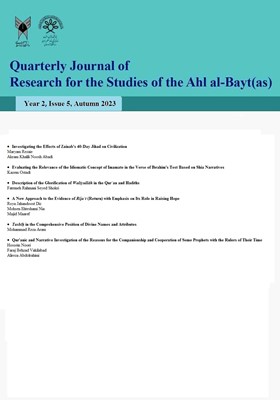Evaluating the Relevance of the Idiomatic Concept of Imamate in the Verse of Ibrahim's Test Based on Shia Narratives
Subject Areas : Quarterly Journal of Research for the Studies of the Ahl al-Bayt
1 - Researcher of Quranic Sciences and Hadith, University of Qurʾan and Hadith, Qom, Iran.
Keywords: Commentary narratives, Shia hadith, Imamiyyah, succession of the Prophet (PBUH),
Abstract :
Historically, the most important issue discussed by Muslims after the Prophet (pbuh) is the issue of Imamate, and thinkers have cited theological, historical and verses of the Holy Qur'an to prove the issue of Imamate and succession of the Prophet (pbuh), one of the most important of these verses is the verse of the test of Prophet Ibrahim (as) or the verse of Imamate. On the other hand, two methods can be followed to investigate the Imamate issue: 1- Explaining the concept of imamate by means of Quranic verses with previous coordinates in the beginning of Islam. 2- Explaining the concept of imamate by means of Quranic verses with coordinates and concepts created later and new. Therefore, it is necessary to clarify the status of references to the verse of Ibrahim's test for the issue of Imamate in the narratives of Imamiyyah. In the upcoming research, hadiths about the test verse of Ibrahim have been discussed, according to these questions: "1- Regarding the verse of Ibrahim's test, how many narratives of the infallible Imams (as) are mentioned in hadith and narrative sources? 2- What is the status of their textual content and the similarity and repetition of narrations about the verse of Ibrahim's test? 3- Are the narratives about Ibrahim's test related to the issue of imamate in today's common sense and do they support this issue? Finally, it became clear that there are few hadiths about verse 124 of Baqarah, of course, most of them (except for a few cases that are doubtful) do not mention the issue of public imamate, especially for us contemporary Shiites; and in a way, the narratives are interpretations with a separate subject from the principle of Imamate.
_||_


